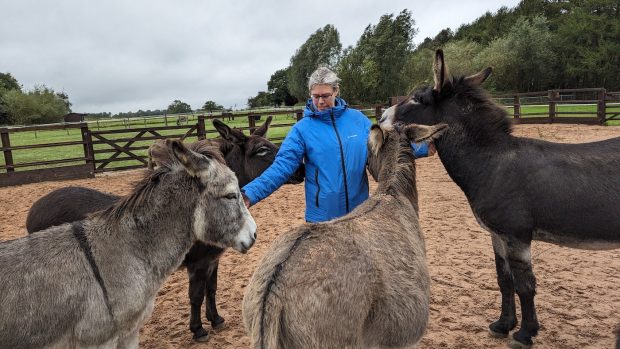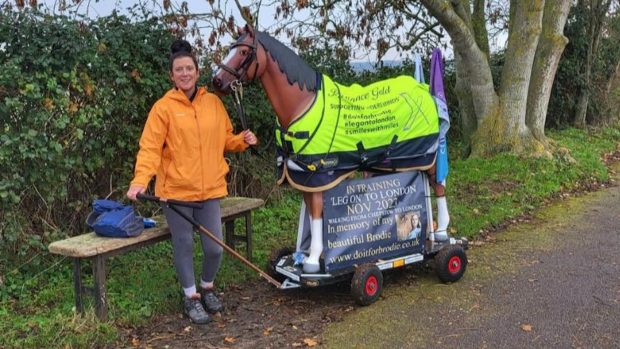Feeling the need to “appear strong” in front of colleagues and peers is one of the biggest single causes for those in the racing industry to avoid seeking mental health help, a study has highlighted.
The research, by Liverpool John Moores University and Racing Welfare, was released on Monday (13 May) to tie in with Mental Health Awareness week (13 to 19 May).
Co-author Will McConn-Palfreyman told guests at the launch at Royal Windsor racecourse that the title, A lifestyle rather than a job, was the sentiment echoed by several trainers during the course of the research.
“That it is this all-encompassing lifestyle is continually spoken about across all facets of racing,” he said.
“There is a good side to that, which is a sense of meaning, a sense of purpose, of being part of something bigger than yourself, which are all healthy psychological concepts. But there is a flip side, which is that it can become too much, leading to burn-out and mental health concerns.”
The study also showed stress, anxiety and depression are the most common mental health concerns across the industry.
A total of 86.67% of jockeys reported they had experienced stress, anxiety or depression over the past 12 months. This figure was 74.55% for trainers, 71.99% for stable staff and 79.25% for stud workers.
These figures came from a questionnaire, completed by more than 1,500 people, and data was also collected through face-to-face interviews and focus groups with 131 individuals.
Mr McConn-Palfreyman stressed this was a “flavour” of what they believe is happening in the industry.
It also found around 27.59% of the racing industry have trouble concentrating or memory loss (30.67% jockeys; 29.09% trainers; 25.06% stable staff; 32.08% stud workers and 21.04% generic).
A perception that they “need to appear ‘strong’ in front of colleagues and peers” was the single biggest barrier for all groups to not seeking support.
“This comes up again and again,” added Mr McConn-Palfreyman. “People wear it as a badge of honour, as part of their identity and who they are. But it has that flip side and that tough side and potentially causes people to be less engaged with the conversation.”
Time constraints, worries over costs, concerns about confidentiality and perceptions of social stigma were among the other reasons.
The top three “stressors” for jockeys were financial insecurity, finding rides and maintaining the appearance of success (“status”). Isolation, long drives to and from the races and weight issues also featured on the list.
More help in terms of careers advice, jockey coaching, a peer support system and financial advice were among the recommendations.
For trainers, horse injuries, financial insecurity and bad debts from owners were highlighted as the top three issues.
The study recommended a debt collection management system and more business support for new trainers could be among the ways to help.
Stable staff reported that a feeling they had to work even if they were sick or injured was the main problem, with ensuring their wages cover their personal costs and lack of pay for overtime other worries.
Flexitime, “in-house” mental health support and an expansion of physiological and psychological support to mirror that given to jockeys have been recommended.
Panel member and licensed trainer Lawney Hill suggested having pastoral care at race meetings could be a good way to ensure trainers, jockeys and staff have easier access to help.
“Trainers, jockeys, training staff need to be at the races — that is their job,” she said.
“Maybe move pastoral care to the races to take the care to them. If there was somebody there they could go and speak to on a completely confidential level, it then makes it easier.”
Watch the full presentation and panel discussion below
Article continues below…
You might also be interested in:

Subscribe to Horse & Hound this spring for great savings

‘No one should suffer in silence’: eventers discuss their mental health to urge others to speak up
‘It’s so easy to look normal on the outside, but be dying inside’
#GoRacingGreen: how horses have helped tackle mental health issues
Debbie Matthews’ #GoRacingGreen idea to welcome all people to racing and equestrian events has received much support
Mr McConn-Palfreyman added a lot of positive work is already happening in the industry.
“I can’t stress that enough and I hope that comes through in the report. Most of us are expanding on that and doing more of it,” he said.
Ed Davey, community head of the Mental Health Foundation, who was also on the panel, said the statistics in the report are “quite comparable” to the overall national picture and praised the research.
“Anecdotally we might hear of problems and issues we want to do something about. But unless we have statistically robust findings, which we have here in this report, it is difficult to know what the right thing is to do. This is absolutely a brilliant next step for this industry, which I really commend. There are certain factors [in here] true of any industry and any community.
“This is a community and that is a real advantage and the other advantage is this is an industry that people feel passionately about and want to be involved in. That is fantastic.”
For all the latest news analysis, competition reports, interviews, features and much more, don’t miss Horse & Hound magazine, on sale every Thursday




